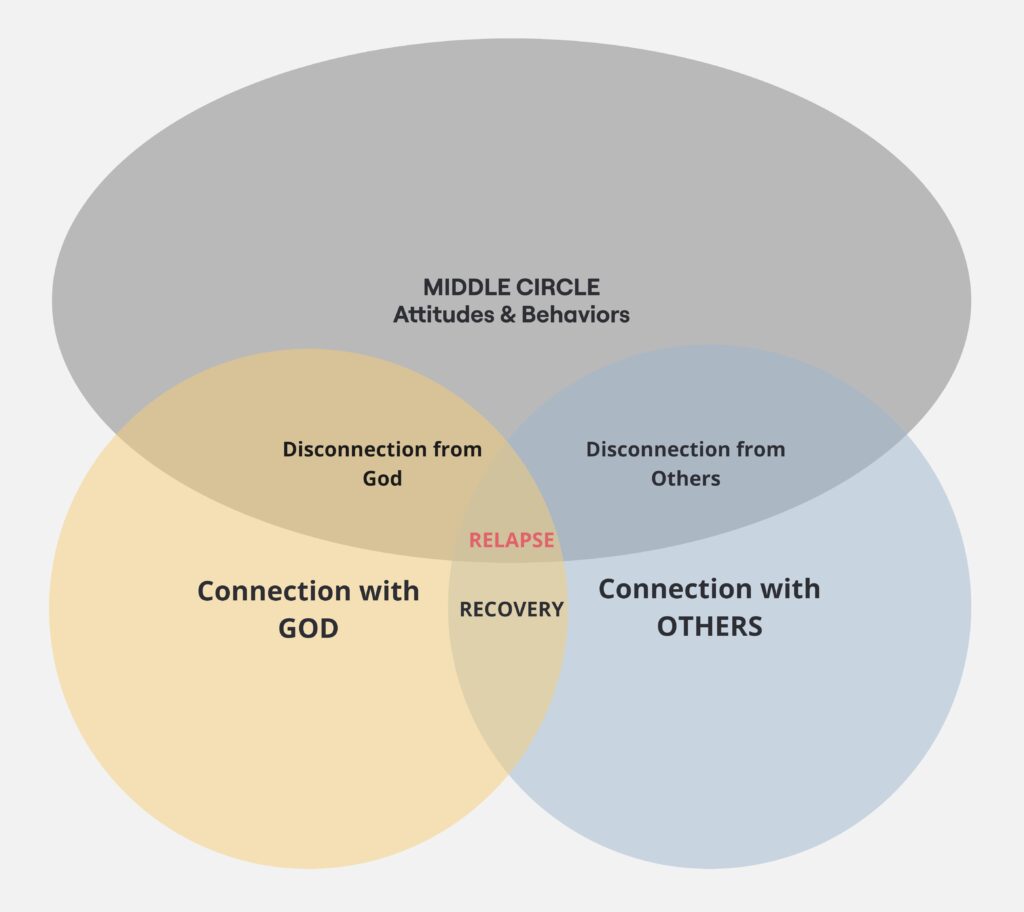The Power of Connection in Recovery:
“24 And let us consider one another to provoke unto love and to good works: 25 Not forsaking the assembling of ourselves together, as the manner of some is; but exhorting one another: and so much the more, as ye see the day approaching.” (Hebrews 10:24-25)
For Christians struggling with addiction, the path to healing isn’t found in isolation or willpower alone—it’s discovered through deepening our relationship with Christ and His body of believers. Just as the early church found strength in fellowship, today’s believers find freedom through authentic connection with God and His people. When we draw near to the Lord and surround ourselves with fellow believers, we experience the transformative power of His love and grace.
Like branches connected to the True Vine, we flourish when we remain rooted in Christ’s love and supported by His community. This divine connection provides the strength we need to overcome any form of dependency—whether substances, behaviors, or other attachments that separate us from God’s perfect plan for our lives. Through Him, we find not just recovery, but complete restoration.
While connection with Christ and His people forms the foundation of recovery, we must also examine and address the subtle behaviors and attitudes that can quietly erode our spiritual growth and recovery journey. Recovery from addiction requires both building strong connections and removing these harmful patterns. These two elements work together in the healing process.
Subtracting Unhelpful Middle-Circle Attitudes & Behaviors:
“2 And be not conformed to this world: but be ye transformed by the renewing of your mind, that ye may prove what is that good, and acceptable, and perfect, will of God.” (Romans 12:2)
In recovery, we typically focus on two key areas: eliminating harmful inner circle behaviors and cultivating healthy outer circle activities. However, there’s a crucial middle ground that demands attention—the “middle circle” behaviors that appear neutral but can quietly undermine our recovery.
While these may not immediately trigger our addiction, they can create patterns that weaken our resilience and recovery foundation. Understanding and addressing these behaviors is vital for maintaining long-term stability.

Here are some of the unhelpful tendencies that emerge from our character defects, which the 12 Steps address.

The Impact of Middle-Circle Behaviors:
The challenge with these examples above lies in their cumulative effect. While each instance may seem minor, together they can create an unstable foundation that makes us vulnerable to relapse. By identifying and gradually addressing these middle-circle behaviors, we strengthen our recovery and build a more sustainable path forward.
Recovery isn’t just about subtracting negative behaviors or adding positive ones—it’s about developing awareness of how our daily choices and habits either support or undermine our well-being. This is the key, it is about doing what it healthy, in our best interest, with balance. This middle territory requires constant vigilance and honest self-assessment.
How It Relates To You:
“Bear ye one another’s burdens, and so fulfil the law of Christ.” (Galatians 6:2)
Recovery from addiction needs both physical and spiritual healing to work. This means getting help for the body while also strengthening your spiritual life. Whether you’re dealing with drugs, alcohol, or other addictive behaviors, real change happens in three ways: building strong relationships with others, taking an honest look at yourself, and fixing small daily habits that might hurt your recovery. These three parts work together to help you stay on a healthy path.
Reflection Questions:
- Which middle-circle behaviors (emotional patterns, relationship habits, lifestyle choices, or environmental factors) do you notice affecting your spiritual walk?
- How has your connection with Christ and His body of believers influenced your journey toward freedom?
- What relationships and fellowship opportunities help you stay rooted in Christ, and which situations might lead you away from His perfect plan?
Scripture to Remember:
“Examine yourselves, whether ye be in the faith; prove your own selves. Know ye not your own selves, how that Jesus Christ is in you, except ye be reprobates?” (2 Corinthians 13:5)
“That ye put off concerning the former conversation the old man, which is corrupt according to the deceitful lusts; And be renewed in the spirit of your mind; And that ye put on the new man, which after God is created in righteousness and true holiness.” (Ephesians 4:22-24)
These powerful passages speak to the heart of recovery and transformation. Second Corinthians calls us to examine ourselves deeply, testing whether Christ truly dwells within us. This self-examination leads naturally into the truth expressed in Ephesians, where we learn that true transformation requires us to “put off the old man” – our former ways of thinking and behaving. We are called to be “renewed in the spirit of our mind,” a renewal that goes far beyond simply stopping addictive behaviors.
When we truly examine ourselves and find Christ within, we experience a complete transformation of our thought patterns, habits, and identity. This examination and renewal process is essential as we consider our middle-circle behaviors, reminding us that genuine recovery requires both honest self-assessment and complete transformation in Christ, rather than mere behavior modification.
Prayer:
Dear Heavenly Father,
Search my heart and reveal to me what parts of my self still need to be surrendered. Help me to grow closer to You and break free from harmful patterns. Give me wisdom to recognize and change behaviors that weaken my recovery. Teach me how to strengthen my connections with You and fellow believers, and guide me towards building healthy relationships, so that I may be of service to others for their benefit and for Your glory.
In Jesus’ pure and blameless name, I pray, amen.




